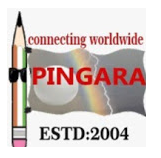Mangaluru: St Aloysius Institute of Education, a leading college of teacher education of the city conducted a farewell programme to forty-nine prospective teachers of its fifteenth batch here. The programme began with the invocation of God’s blessing through a hymn followed by a prayer service conducted by the juniors.
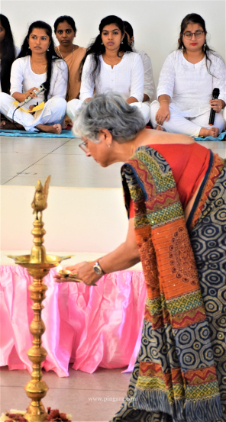
Speaking on the occasion, Rev. Fr Dr Praveen Martis SJ, Director, said, “Education is considered as one of the key processes in society, as it influences on the personal lives of students and the same leads for social coherence at national level. Teachers are seen as key actors in the process of education, because teacher-education programme helps them to apply the theoretical knowledge and skills in classrooms that influence the students to engage in productive change. Teachers are the agents who promote educational status of students. In today’s school context teachers’ professional role has changed from the traditional method to a designer and implementer of curriculum through technology. Therefore, it is a critical time for teachers to meet with the changing needs of students”. Adding further he said, St Aloysius B. Ed College has sensitised the trainee-teachers on four Jesuit education qualities, namely, competence, commitment, compassion and conscience which will help them to grow professionals as they continue with their career.

Teacher has a very important role to play in imparting quality education in a society. The quality of teaching has been a serious concern nowadays. It is the most important factor in an educational institute in influencing engagement and achievement. Knowledge has become the highest value commodity in any country, and a high quality education is a necessity for everyone. “A country that doesn’t have confidence in its teachers will have great difficulty in improving education.” This saying aptly describes the role of a teacher.
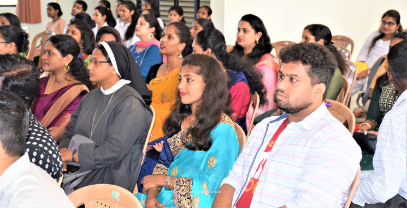
Coming to our Jammu Kashmir state, Minister for Education, Naeem Akhtar is setting increasingly ambitious goals for reforming the education system. The quality of teachers is central to meeting these goals. For improving our education system, we need high quality teaching for each and every student.

So to increase the quality of teachers and attractiveness of teaching as a profession, Jammu Kashmir state should frame policies that will increase the competence and career prospects of teachers. Teacher appraisal systems can help in improving teaching and offering new roles for outstanding teachers.
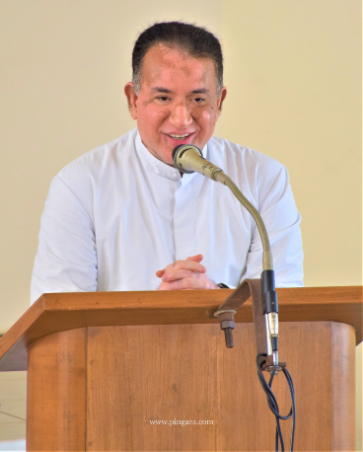
In framing policies on teaching, there is always a balance to be struck between the requirements that government and societies set for the training and development of teachers because of their value for the future of young people and society. Directorate of School Education Kashmir (DSEK) and Directorate of School Education Jammu (DSEJ) should provide feedback to teachers on regular intervals that will be helpful for their work and it will increase their job satisfaction and their development as teache

Teacher has a very important role to play in imparting quality education in a society. The quality of teaching has been a serious concern nowadays. It is the most important factor in an educational institute in influencing engagement and achievement. Knowledge has become the highest value commodity in any country, and a high quality education is a necessity for everyone. “A country that doesn’t have confidence in its teachers will have great difficulty in improving education.” This saying aptly describes the role of a teacher.

Coming to our Jammu Kashmir state, Minister for Education, Naeem Akhtar is setting increasingly ambitious goals for reforming the education system. The quality of teachers is central to meeting these goals. For improving our education system, we need high quality teaching for each and every student.
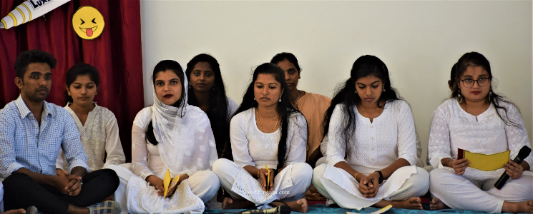
So to increase the quality of teachers and attractiveness of teaching as a profession, Jammu Kashmir state should frame policies that will increase the competence and career prospects of teachers. Teacher appraisal systems can help in improving teaching and offering new roles for outstanding teachers.
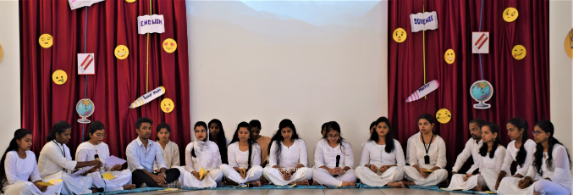
In framing policies on teaching, there is always a balance to be struck between the requirements that government and societies set for the training and development of teachers because of their value for the future of young people and society. Directorate of School Education Kashmir (DSEK) and Directorate of School Education Jammu (DSEJ) should provide feedback to teachers on regular intervals that will be helpful for their work and it will increase their job satisfaction and their development as teache
Teacher has a very important role to play in imparting quality education in a society. The quality of teaching has been a serious concern nowadays. It is the most important factor in an educational institute in influencing engagement and achievement. Knowledge has become the highest value commodity in any country, and a high quality education is a necessity for everyone. “A country that doesn’t have confidence in its teachers will have great difficulty in improving education.” This saying aptly describes the role of a teacher.
Coming to our Jammu Kashmir state, Minister for Education, Naeem Akhtar is setting increasingly ambitious goals for reforming the education system. The quality of teachers is central to meeting these goals. For improving our education system, we need high quality teaching for each and every student.
So to increase the quality of teachers and attractiveness of teaching as a profession, Jammu Kashmir state should frame policies that will increase the competence and career prospects of teachers. Teacher appraisal systems can help in improving teaching and offering new roles for outstanding teachers.
In framing policies on teaching, there is always a balance to be struck between the requirements that government and societies set for the training and development of teachers because of their value for the future of young people and society. Directorate of School Education Kashmir (DSEK) and Directorate of School Education Jammu (DSEJ) should provide feedback to teachers on regular intervals that will be helpful for their work and it will increase their job satisfaction and their development as teache
Teacher has a very important role to play in imparting quality education in a society. The quality of teaching has been a serious concern nowadays. It is the most important factor in an educational institute in influencing engagement and achievement. Knowledge has become the highest value commodity in any country, and a high quality education is a necessity for everyone. “A country that doesn’t have confidence in its teachers will have great difficulty in improving education.” This saying aptly describes the role of a teacher.
Coming to our Jammu Kashmir state, Minister for Education, Naeem Akhtar is setting increasingly ambitious goals for reforming the education system. The quality of teachers is central to meeting these goals. For improving our education system, we need high quality teaching for each and every student.
So to increase the quality of teachers and attractiveness of teaching as a profession, Jammu Kashmir state should frame policies that will increase the competence and career prospects of teachers. Teacher appraisal systems can help in improving teaching and offering new roles for outstanding teachers.
In framing policies on teaching, there is always a balance to be struck between the requirements that government and societies set for the training and development of teachers because of their value for the future of young people and society. Directorate of School Education Kashmir (DSEK) and Directorate of School Education Jammu (DSEJ) should provide feedback to teachers on regular intervals that will be helpful for their work and it will increase their job satisfaction and their development as teache
Teacher has a very important role to play in imparting quality education in a society. The quality of teaching has been a serious concern nowadays. It is the most important factor in an educational institute in influencing engagement and achievement. Knowledge has become the highest value commodity in any country, and a high quality education is a necessity for everyone. “A country that doesn’t have confidence in its teachers will have great difficulty in improving education.” This saying aptly describes the role of a teacher.
Coming to our Jammu Kashmir state, Minister for Education, Naeem Akhtar is setting increasingly ambitious goals for reforming the education system. The quality of teachers is central to meeting these goals. For improving our education system, we need high quality teaching for each and every student.
So to increase the quality of teachers and attractiveness of teaching as a profession, Jammu Kashmir state should frame policies that will increase the competence and career prospects of teachers. Teacher appraisal systems can help in improving teaching and offering new roles for outstanding teachers.
In framing policies on teaching, there is always a balance to be struck between the requirements that government and societies set for the training and development of teachers because of their value for the future of young people and society. Directorate of School Education Kashmir (DSEK) and Directorate of School Education Jammu (DSEJ) should provide feedback to teachers on regular intervals that will be helpful for their work and it will increase their job satisfaction and their development as teache
In looking across these diverse perspectives and pieces, we saw several salient themes that connected authors’ respective contributions. We organized the issue to explore four of these; sections bring together articles that explore how change agents might expose power and privilege, create responsive environments, engage in messy and ongoing work of pursuing ideals, and benefit from international collaborations. While manuscripts are organized into sections to highlight convergences and divergences of perspectives within themes, readers will find connections across sections as well.
In looking across these diverse perspectives and pieces, we saw several salient themes that connected authors’ respective contributions. We organized the issue to explore four of these; sections bring together articles that explore how change agents might expose power and privilege, create responsive environments, engage in messy and ongoing work of pursuing ideals, and benefit from international collaborations. While manuscripts are organized into sections to highlight convergences and divergences of perspectives within themes, readers will find connections across sections as well.
In looking across these diverse perspectives and pieces, we saw several salient themes that connected authors’ respective contributions. We organized the issue to explore four of these; sections bring together articles that explore how change agents might expose power and privilege, create responsive environments, engage in messy and ongoing work of pursuing ideals, and benefit from international collaborations. While manuscripts are organized into sections to highlight convergences and divergences of perspectives within themes, readers will find connections across sections as well.
In looking across these diverse perspectives and pieces, we saw several salient themes that connected authors’ respective contributions. We organized the issue to explore four of these; sections bring together articles that explore how change agents might expose power and privilege, create responsive environments, engage in messy and ongoing work of pursuing ideals, and benefit from international collaborations. While manuscripts are organized into sections to highlight convergences and divergences of perspectives within themes, readers will find connections across sections as well.
In looking across these diverse perspectives and pieces, we saw several salient themes that connected authors’ respective contributions. We organized the issue to explore four of these; sections bring together articles that explore how change agents might expose power and privilege, create responsive environments, engage in messy and ongoing work of pursuing ideals, and benefit from international collaborations. While manuscripts are organized into sections to highlight convergences and divergences of perspectives within themes, readers will find connections across sections as well.
In looking across these diverse perspectives and pieces, we saw several salient themes that connected authors’ respective contributions. We organized the issue to explore four of these; sections bring together articles that explore how change agents might expose power and privilege, create responsive environments, engage in messy and ongoing work of pursuing ideals, and benefit from international collaborations. While manuscripts are organized into sections to highlight convergences and divergences of perspectives within themes, readers will find connections across sections as well.
In looking across these diverse perspectives and pieces, we saw several salient themes that connected authors’ respective contributions. We organized the issue to explore four of these; sections bring together articles that explore how change agents might expose power and privilege, create responsive environments, engage in messy and ongoing work of pursuing ideals, and benefit from international collaborations. While manuscripts are organized into sections to highlight convergences and divergences of perspectives within themes, readers will find connections across sections as well.
In looking across these diverse perspectives and pieces, we saw several salient themes that connected authors’ respective contributions. We organized the issue to explore four of these; sections bring together articles that explore how change agents might expose power and privilege, create responsive environments, engage in messy and ongoing work of pursuing ideals, and benefit from international collaborations. While manuscripts are organized into sections to highlight convergences and divergences of perspectives within themes, readers will find connections across sections as well.
Dr Farita Viegas, Principal, in her message said, “Students learn from their teachers rather than their syllabus. It is the teachers who help students grow as responsible people. School is a place of socialization and academic learning”. She exhorted the students to see the light within themselves so as to identify the light in their students and be transformative leaders.
Sr Smithapriya D’Souza UFS shared her experiences of the two-year B.Ed programme on behalf of her batch. The farewell function also consisted of group songs, dances, and the outgoing students expressed their appreciation to their alma mater by handing over a gift of love.
